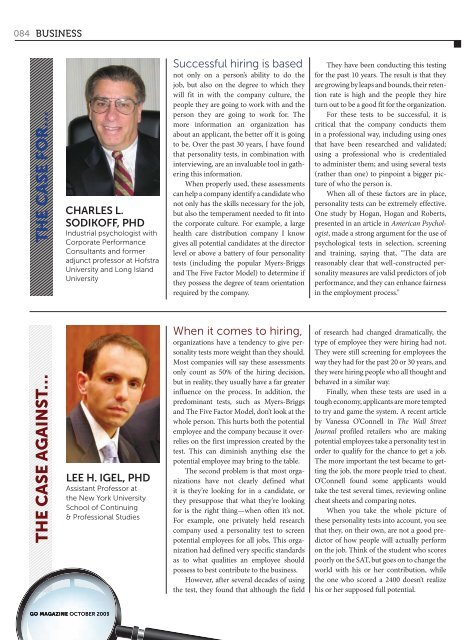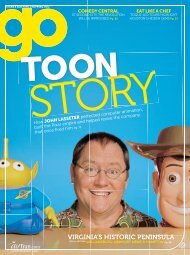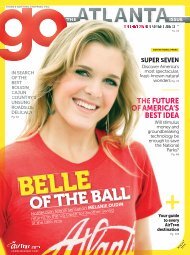You also want an ePaper? Increase the reach of your titles
YUMPU automatically turns print PDFs into web optimized ePapers that Google loves.
084<br />
BUSINESS<br />
THE CASE FOR…<br />
THE CASE AGAINST…<br />
CHARLES L.<br />
SODIKOFF, PHD<br />
Industrial psychologist with<br />
Corporate Performance<br />
Consultants and former<br />
adjunct professor at Hofstra<br />
University and Long Island<br />
University<br />
LEE H. IGEL, PHD<br />
Assistant Professor at<br />
the New York University<br />
School of Continuing<br />
& Professional Studies<br />
GO GOO MAGAZINE MAG AGAZINE OCTOBER<br />
E <strong>2009</strong> 200 009<br />
Successful hiring is based<br />
not only on a person’s ability to do the<br />
job, but also on the degree to which they<br />
will fit in with the company culture, the<br />
people they are going to work with and the<br />
person they are going to work for. The<br />
more information an organization has<br />
about an applicant, the better off it is going<br />
to be. Over the past 30 years, I have found<br />
that personality tests, in combination with<br />
interviewing, are an invaluable tool in gathering<br />
this information.<br />
When properly used, these assessments<br />
can help a company identify a candidate who<br />
not only has the skills necessary for the job,<br />
but also the temperament needed to fit into<br />
the corporate culture. For example, a large<br />
health care distribution company I know<br />
gives all potential candidates at the director<br />
level or above a battery of four personality<br />
tests (including the popular Myers-Briggs<br />
and The Five Factor Model) to determine if<br />
they possess the degree of team orientation<br />
required by the company.<br />
When it comes to hiring,<br />
organizations have a tendency to give personality<br />
tests more weight than they should.<br />
Most companies will say these assessments<br />
only count as 50% of the hiring decision,<br />
but in reality, they usually have a far greater<br />
influence on the process. In addition, the<br />
predominant tests, such as Myers-Briggs<br />
and The Five Factor Model, don’t look at the<br />
whole person. This hurts both the potential<br />
employee and the company because it overrelies<br />
on the first impression created by the<br />
test. This can diminish anything else the<br />
potential employee may bring to the table.<br />
The second problem is that most organizations<br />
have not clearly defined what<br />
it is they’re looking for in a candidate, or<br />
they presuppose that what they’re looking<br />
for is the right thing—when often it’s not.<br />
For example, one privately held research<br />
company used a personality test to screen<br />
potential employees for all jobs. This organization<br />
had defined very specific standards<br />
as to what qualities an employee should<br />
possess to best contribute to the business.<br />
However, after several decades of using<br />
the test, they found that although the field<br />
They have been conducting this testing<br />
for the past 10 years. The result is that they<br />
are growing by leaps and bounds, their retention<br />
rate is high and the people they hire<br />
turn out to be a good fit for the organization.<br />
For these tests to be successful, it is<br />
critical that the company conducts them<br />
in a professional way, including using ones<br />
that have been researched and validated;<br />
using a professional who is credentialed<br />
to administer them; and using several tests<br />
(rather than one) to pinpoint a bigger picture<br />
of who the person is.<br />
When all of these factors are in place,<br />
personality tests can be extremely effective.<br />
One study by Hogan, Hogan and Roberts,<br />
presented in an article in American Psychologist,<br />
made a strong argument for the use of<br />
psychological tests in selection, screening<br />
and training, saying that, “The data are<br />
reasonably clear that well-constructed personality<br />
measures are valid predictors of job<br />
performance, and they can enhance fairness<br />
in the employment process.”<br />
of research had changed dramatically, the<br />
type of employee they were hiring had not.<br />
They were still screening for employees the<br />
way they had for the past 20 or 30 years, and<br />
they were hiring people who all thought and<br />
behaved in a similar way.<br />
Finally, when these tests are used in a<br />
tough economy, applicants are more tempted<br />
to try and game the system. A recent article<br />
by Vanessa O’Connell in The Wall Street<br />
Journal profiled retailers who are making<br />
potential employees take a personality test in<br />
order to qualify for the chance to get a job.<br />
The more important the test became to getting<br />
the job, the more people tried to cheat.<br />
O’Connell found some applicants would<br />
take the test several times, reviewing online<br />
cheat sheets and comparing notes.<br />
When you take the whole picture of<br />
these personality tests into account, you see<br />
that they, on their own, are not a good predictor<br />
of how people will actually perform<br />
on the job. Think of the student who scores<br />
poorly on the SAT, but goes on to change the<br />
world with his or her contribution, while<br />
the one who scored a 2400 doesn’t realize<br />
his or her supposed full potential.
















